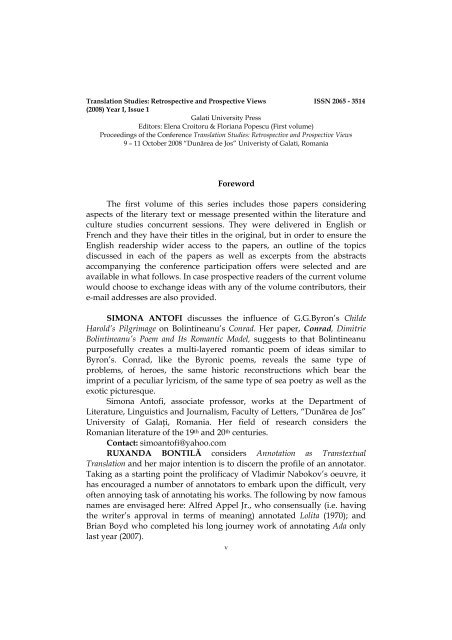translation studies. retrospective and prospective views
translation studies. retrospective and prospective views
translation studies. retrospective and prospective views
Create successful ePaper yourself
Turn your PDF publications into a flip-book with our unique Google optimized e-Paper software.
Translation Studies: Retrospective <strong>and</strong> Prospective Views ISSN 2065 - 3514<br />
(2008) Year I, Issue 1<br />
Galati University Press<br />
Editors: Elena Croitoru & Floriana Popescu (First volume)<br />
Proceedings of the Conference Translation Studies: Retrospective <strong>and</strong> Prospective Views<br />
9 – 11 October 2008 “Dunărea de Jos” Univeristy of Galati, Romania<br />
Foreword<br />
The first volume of this series includes those papers considering<br />
aspects of the literary text or message presented within the literature <strong>and</strong><br />
culture <strong>studies</strong> concurrent sessions. They were delivered in English or<br />
French <strong>and</strong> they have their titles in the original, but in order to ensure the<br />
English readership wider access to the papers, an outline of the topics<br />
discussed in each of the papers as well as excerpts from the abstracts<br />
accompanying the conference participation offers were selected <strong>and</strong> are<br />
available in what follows. In case <strong>prospective</strong> readers of the current volume<br />
would choose to exchange ideas with any of the volume contributors, their<br />
e-mail addresses are also provided.<br />
SIMONA ANTOFI discusses the influence of G.G.Byron’s Childe<br />
Harold’s Pilgrimage on Bolintineanu’s Conrad. Her paper, Conrad, Dimitrie<br />
Bolintineanu’s Poem <strong>and</strong> Its Romantic Model, suggests to that Bolintineanu<br />
purposefully creates a multi-layered romantic poem of ideas similar to<br />
Byron’s. Conrad, like the Byronic poems, reveals the same type of<br />
problems, of heroes, the same historic reconstructions which bear the<br />
imprint of a peculiar lyricism, of the same type of sea poetry as well as the<br />
exotic picturesque.<br />
Simona Antofi, associate professor, works at the Department of<br />
Literature, Linguistics <strong>and</strong> Journalism, Faculty of Letters, “Dunărea de Jos”<br />
University of Galaţi, Romania. Her field of research considers the<br />
Romanian literature of the 19 th <strong>and</strong> 20 th centuries.<br />
Contact: simoantofi@yahoo.com<br />
RUXANDA BONTILĂ considers Annotation as Transtextual<br />
Translation <strong>and</strong> her major intention is to discern the profile of an annotator.<br />
Taking as a starting point the prolificacy of Vladimir Nabokov’s oeuvre, it<br />
has encouraged a number of annotators to embark upon the difficult, very<br />
often annoying task of annotating his works. The following by now famous<br />
names are envisaged here: Alfred Appel Jr., who consensually (i.e. having<br />
the writer’s approval in terms of meaning) annotated Lolita (1970); <strong>and</strong><br />
Brian Boyd who completed his long journey work of annotating Ada only<br />
last year (2007).<br />
v












